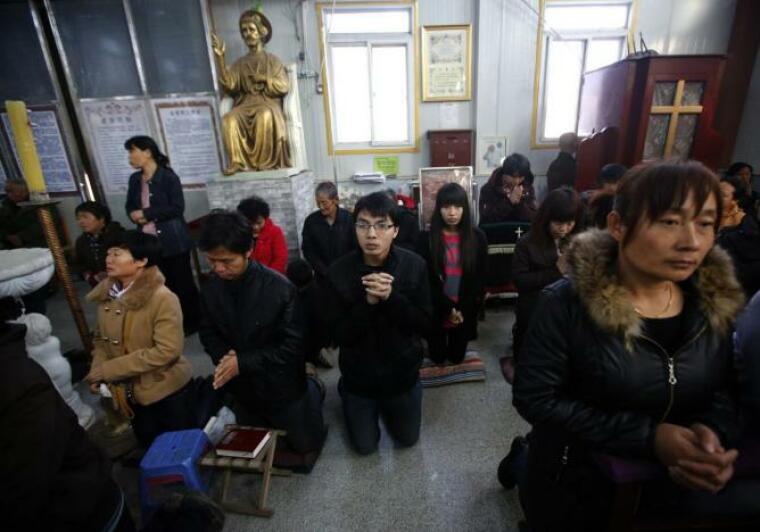Chinese church forced to meet outdoors after landlord refuses to renew lease

A landlord has refused to renew the lease of a church in China's Hubei province, prompting the parishioners to conduct their meetings on the streets and in the homes of church members.
According to a report from China Aid, members of Yanji Christian Church began meeting outside earlier this year after government officials prohibited them from entering their building.
In December 2016, the Echeng District Religious Affairs Bureau sent a notice to inform the church that its services and religious activities have been banned. The bureau claimed that the services were conducted without government permission and further stated that the church will no longer be allowed to carry out any missionary programs in the area.
After the church's lease expired, the landlord refused to renew it. On several occasions, church members experienced harassment while meeting outdoors, as people hired by the authorities threw firecrackers at them and doused them with mud.
Communist Party officials have been suspected of pressuring landlords to terminate contracts of unregistered churches.
In Guangdong province, a landlord decided to evict a church, which had been reportedly harassed by officials for not joining the state-sanctioned Three-Self Church.
When the pastor of the church, Ma Ke, asked about the decision to terminate the contract, the landlord said that he had been visited several times by the police.
In September 2015, Ma had been forced from his personal residence after a landlord decided to end his contract. The landlord reportedly stated that he would rather pay the liquidated fees rather than face continued police pressure.
Ma was also rejected when he tried to renew his Guangzhou residential permit online. China Aid noted that other church members were also barred from renewing their permits, which is required when obtaining driver's licenses or purchasing new cars.
The Chinese government has been intensifying its crackdown on churches ahead of the implementation of the new set of revisions to the Regulation on Religious Affairs, which is expected to go into effect in February.
Earlier this year, an organization with links to the Chinese Communist Party unveiled a new document detailing plans on how the government can enforce its restrictions on churches, including forced registration with state-run Christian institution.
Under the new program, churches that refuse to register with the state-run Three-Self Patriotic Movement will be banned. Churches that have been deemed by the public security and religious affairs bureau as "illegal religious organizations, organizations influenced or controlled by foreign powers intending to infiltrate [the country], or [religious] gathering places that broke the laws or are under the control of cults," will be shut down.
 Christians don't have to affirm transgenderism, but they can’t express that view at work: tribunal
Christians don't have to affirm transgenderism, but they can’t express that view at work: tribunal Archaeology discovery: Medieval Christian prayer beads found on Holy Island
Archaeology discovery: Medieval Christian prayer beads found on Holy Island Presbyterian Church in America votes to leave National Association of Evangelicals
Presbyterian Church in America votes to leave National Association of Evangelicals Over 50 killed in 'vile and satanic' attack at Nigerian church on Pentecost Sunday
Over 50 killed in 'vile and satanic' attack at Nigerian church on Pentecost Sunday Ukrainian Orthodox Church severs ties with Moscow over Patriarch Kirill's support for Putin's war
Ukrainian Orthodox Church severs ties with Moscow over Patriarch Kirill's support for Putin's war Islamic State kills 20 Nigerian Christians as revenge for US airstrike
Islamic State kills 20 Nigerian Christians as revenge for US airstrike Man who served 33 years in prison for murder leads inmates to Christ
Man who served 33 years in prison for murder leads inmates to Christ


 Nigerian student beaten to death, body burned over ‘blasphemous’ WhatsApp message
Nigerian student beaten to death, body burned over ‘blasphemous’ WhatsApp message 'A new low': World reacts after Hong Kong arrests 90-year-old Cardinal Joseph Zen
'A new low': World reacts after Hong Kong arrests 90-year-old Cardinal Joseph Zen Iran sentences Christian man to 10 years in prison for hosting house church worship gathering
Iran sentences Christian man to 10 years in prison for hosting house church worship gathering French Guyana: Pastor shot dead, church set on fire after meeting delegation of Evangelicals
French Guyana: Pastor shot dead, church set on fire after meeting delegation of Evangelicals ‘Talking Jesus’ report finds only 6% of UK adults identify as practicing Christians
‘Talking Jesus’ report finds only 6% of UK adults identify as practicing Christians Mission Eurasia ministry center blown up in Ukraine, hundreds of Bibles destroyed: 'God will provide'
Mission Eurasia ministry center blown up in Ukraine, hundreds of Bibles destroyed: 'God will provide' Church holds service for first time after ISIS desecrated it 8 years ago
Church holds service for first time after ISIS desecrated it 8 years ago Burger King apologizes for 'offensive campaign' using Jesus' words at the Last Supper
Burger King apologizes for 'offensive campaign' using Jesus' words at the Last Supper Uganda: Muslims abduct teacher, burn him inside mosque for praying in Christ’s name
Uganda: Muslims abduct teacher, burn him inside mosque for praying in Christ’s name